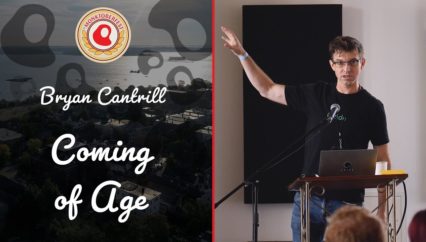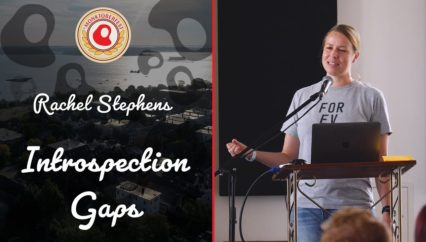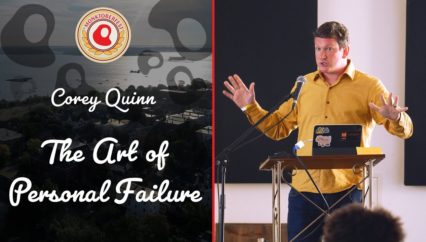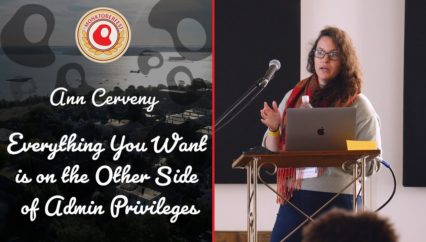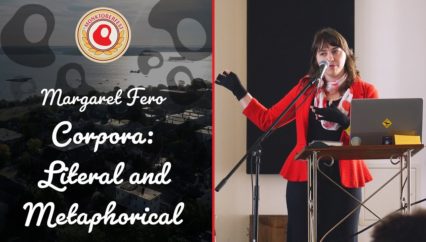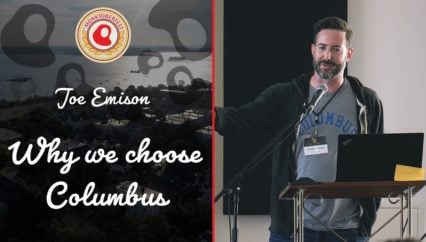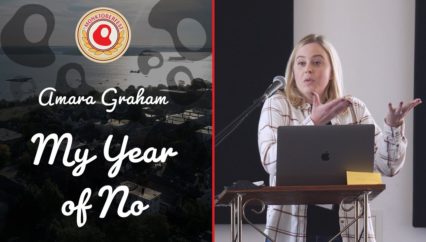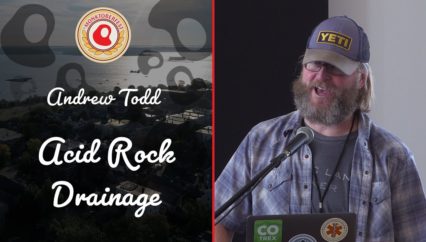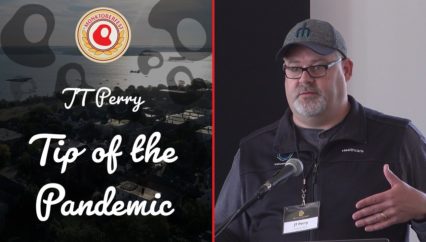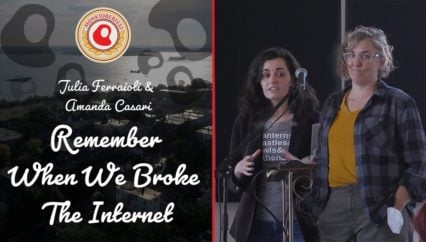If you had to start civilization over from scratch, could we do it? How would we do it? How would our reliance on technology — both the good and the bad — impact that? What would be the role of documentation and mentorship be, and is there anything that we can apply to our social interactions and structures today? This talk leverages a community of voices to explore these questions.
Transcript
Hey, look at that!, OK. All right, so yeah, great to be here. Love this event, and, just honored to be here. So thank you to the staff and thank you to volunteers and sponsors and all that stuff.
So all right, so we’re going to talk about mentorship and, you know, could we be able to start — restart civilization if everything were, you know, go to shit. Kind of seems like we’ve seen some of that.
Lost connection to server. This is fantastic. Oh, wait. Oh, this is even better. You all see something that I don’t. Well, Bigfoot is real. We’re going to reload first.
OK, so I just kind of spoiled that. That’s just great. Nope, nope, stop. OK.
Do it this way. Talk amongst yourselves.
You need a hand here?
>> No, a hand is kind of good. That kind of hand.
[applause]
OK, now we can do this! Fantastic. Technology was a really bad idea. I feel like that’s a talk somebody should give next time. I already said that, we’ll move on. So we seem to have this fascination with dystopian thrillers. They often kind of come in like — you have your adult action films, the adult fiction, you have young adult fiction, you have the movies, the TV shows, we kind of get inundated with them on a constant basis. Who’s kind of a fan of dystopian — everybody is like yeah, yes! All right. We all have our favorite ones.
We have some that, you know, tend to, you know, go on for over a decade. Others tend to just be a flash in the pan. Some kind of our deep, dark, unsettling, and then are kind of take that comedic twist and just to note that other than Shawn of the Dead is the best of them all. That’s really the end of the talk. But I zombie if you haven’t seen t the first few seasons are comedic gold. I highly recommend them. I’m not sponsored by them, but I probably should be by this point. But they all come from this premise that humanity sucks and here’s what could happen if we continue down this path, which seems to have culminated in the bottom right there recently.
Or they kind of come in like there’s this traumatic or catastrophic event and let’s explore the possible view of how humanity might respond from such a thing. But, I think — I think we all could agree that there’s nothing better than the apocalyptic work from the genius author Jane Austen, Pride and Prejudice. Sorry, pride + prejudice zombies. Amazing. If you haven’t seen it, I recommend it, it’s so fantastically good. But one of my favorite shows was a show called Revolution. Evidently not enough people, because it could have been on and they kinda left you hanging, but it kind of started with this idea that there was some event, like an EMP, global EMP, knocks off all the electricity to the entire world, so everything that we know runs on electricity, so that means nothing works and it didn’t come back. So that was the first bit and it kind of sets — that was year 2027, so we know what we have to look forward to and overnight the entire world gets thrown back to like 140 years where there was no electricity and then jump forward about 15 years to the natural evolution of how we use Toyota Priuses ultimately when they stop working is we set up gardens in them and saw how society evolved. It took a view into that. It was fascinating, but like I said, not everybody probably liked it as much, because it, you know, didn’t continue on. But I do kind of love the philosophical and the sociological view that all of these shows and books give us around exploring their ideas of humanity. But if you ever kind of stop to think this, what if everything we knew, just stops working and we kind of had to start from scratch. Could we do it? Anyone else have that like morbid thought? So a few of us are probably demented like me. We have — I’m probably going to start a support group. Hi, I’m Jeremy Meiss, I’m Director of Dev Rel at CircleCI. I apologize in advance for anything that I might say. But you followed me, or I mean you took the choice.
All right, so over the past few years, though, we have seen like experienced something that none of us in our lifetime ever had. The pandemic that we’re still experiencing the effects of, and many are still dealing with, has just brought about this complete lockdown, changed how we view our lives, jobs, family, friends and more.
And during this time I have I was in a group chat with a number of friends, not really that many. This is a stock photograph because I don’t have that many friends. But the topic came about, like, just kind of shooting the shit at, you know, 5:00 in the afternoon, could we start civilization from scratch? Do we have those tools to do so? Is it you know, the instructions, the skillsets, have we been training people to do those things? Do we have all the resources? And kinda got me down that rabbit hole of kind of thinking about it, doing some research, seeing what other people have said, seems like a fair number people have gone through this. A book by Lewis Dartnelle it was called How To Rebuild the World From Scratch. He talks about a group of people or survivors in a post-apocalyptic world would need in order to survive, if everything collapsed everything they would have to have.
And then a study to the Long Now Foundation that they started in 1996 to foster kind of this long-term thinking where the author went down their own rabbit hole of trying to look at civilization this way, explored, you know, some of the learnings that Thomas Thwaite had gained from trying to build a toaster from scratch in 2012, which is common without any real skills, just tried to build it and he smelted the ore, coasted the plastic out of oil and such and got a prototype that worked for about 30 seconds. Which is that down there in the right. He actually has a great TEDTalk around this, so I definitely recommend checking that out.
But the Long Now Foundation kind of set out to create this manual for civilization, and they started a library/bar/event space, set in San Francisco, which evidently is what you do, it has to be multipurpose and they collected 3500 books all into one place, all of them were like most essential to sustaining civilization, into a place in San Francisco that just happens to have a history of fires and earthquakes and such, so it doesn’t really feel like disaster recovery was there, but keeping all those things together. Single point of failures, not a really great idea for civilization.
So the question jumped out at me: How did our ancient ancestors pass on the things that they were learning? How do we know to get up here ultimately in front of a laptop connected to a projector and we all see it. So long before we had like Wikipedia or the Encyclopedia Britannica salesperson, which most of us remember buying the encyclopedia, like one volume, yeah, before that, ancient peoples had this thing called orality. Before writing really became like this thing for many cultures, it’s called orality. It’s the most widespread part of human communication. It also really gave us the stepping stones that allowed us to get to where we are today. It was a necessity for the growth of any civilization. And it’s that function of sharing the information that really has helped cultures continue to advance on how to hunt and plant and navigate, etc.
It’s also hearing from a group of tribal leaders, the stories of the generations past, passing on those customs that kind of shaped lifetime, and then that you have ultimately will pass on, as well.
And in the ancient world, you know, that took the form of like the Iliad and the Odyssey was a form of passing that on, Beowulf, the modern world has the short stories and songs that the aboriginal peoples in Australia, they actually used to navigate their country, but eventually, once things began to start be written down by that form of preserving information, it gave way to what we call now, oral tradition. And that’s that recall and sharing of specific texts and cultural knowledge verbally. It’s like sitting around the campfire with the grandparents, hearing them relate their early days working the fields in Nebraska, taking a ride in the old pickup truck with your grandfather to find that perfect trout hole, trout run? In, you know the mountains of Colorado, how to survive so Colorado avalanches, how to hike in Colorado, essentially how my wife who grew up in Colorado would call it how to not be a Coloradan, if you were there, you would understand.
Textually there are other ways of passing on trades and job functions. So in some cultures, societies, if your father it was a blacksmith, would you become a blacksmith, as well, if your mother made tapestries, you probably would, as well. Everything revolved around the family business and if your family didn’t with one, there was always the need to pass on those trades to other willing persons that wanted to become a blacksmith or wanted to become working with tapestries and whatnot, be masons and whatnot, always looking for somebody that would build apprenticeship.
That was the next way of kind of how to come out and share and build trades and people would learn and continue on.
Now, Erik Desk, who’s here, in the last Monktoberfest 2019, he actually kind of talked about some of this same subject. He also talked about the Copagnons in Devoir, that term comes from the Latin Compagnon, means one who shares bread with another. So before they could become a Compagnon, the winner were sent off to train for sometimes ten years. After they became proficient in the basics of that, they went on this long journey in France which they called the tour de France. Learning like the specialized aspects of that chosen trait from the masters who were there and they would become known as the Compagnon as the tour de France. After they learned from the masters, they would spend a year learning a dissertation of sorts where they would present in front of the masters for that trade so they could show that they had become a master themselves of that craft. So that’s kind of where we get our masters programs and dissertations comes from that.
Now, this is where really, I have to kind of step back that I don’t really believe that through apprenticeship or really mentorship are we really going to be able to rebuild civilization from scratch. Alexander Rose put it this way: After the fall of all the great civilization, the Egyptians, Mayans, and Roman Empires, all that beauty that they created, it was worthless, because the society around it was not there to maintain it, contextualize it and protect it. And so I think it’s important that mentorship is where we can continue to contextualize the cultures necessarily to be able to rebuild our civilization. I don’t feel like that’s possible, but I do believe it’s how we preserve our cultures within the organizations which build up the societies around us.
So I’m going to dive into what does mentorship look like from that perspective? Before I go too far, there’s this view of coaching and there’s this view of mentoring.
Coaching is really like, you know, there is a distinction. Mentors are those that they give you advice, they’re going to kind of help you navigate through your career, usually for kind of the long haul, instead of just that short term kind of flash in the pan, become the sounding board, share their experiences and then walk with you as you go through that. But a coach they literally just coach you. They take how you perform in a given situation and then they give you those suggestions, constructive criticism for achieving better results on a thing that you’ve done, but it’s usually for a short goal and a short term to achieve that goal.
Recently a few months ago, I started a Twitter thread asking for those that had been mentors or who were mentees, to kind of share their stories, share how, you know, all of their wins and their failures and things they learned having been mentored.
I wanted to use their replies and learn some ways we can conceptualize ways to be mentored or can mentor.
First the practical things for the mentor: Rachel kicked off a great thread, had a number of really great nuggets, the first one was really understand the why. Understand why you are, why you want to be a mentor. Understand what it is that you bring to the table, that you possess, and if you don’t have that knowledge that someone’s asking you help them with, be honest about it. It’s going to be better for both of you to know what you can and cannot bring to the relationship.
Jason said that it is hard sometimes to identify how a mentee learn but it is essential to give them the tools and give them that journey along with you to make sure that they’re able to figure it out. Determine what’s needed is definitely that challenge.
Rachel, Tamimi and Dan here all touched on you don’t want to have an open-ended OK, let’s be a mentor, let’s have coffee and shoot the shit about something. That’s part of it, but there needs to be an outcome and timeline of what you both want to set out for you. So you’re both getting what you need out of the situation.
Rachel again had some good things like the key steps is to first set the focus topics which move you towards the desired outcome that you want and also recapping what was discussed and learned after each session. And also, there was kind of the thought here, kind of keeping a shared doc of your meetings, notes in and progress, so that you’re able to kind of track it all so you can reference back, to hey, we discussed at this point. There’s always that reference point you can come back to.
But always leave on good terms. Be kind on your way up, because you’re probably going to meet again on your way down was how she put it. There was also great advice from Gareth and Beth here, that is something for both mentors and mentees, that it’s OK to not now, it’s OK to say I don’t know about that, but let’s work together to figure that out. You know, one thing that Gareth said here was things you remember telling her one of the first meetings is it’s perfectly acceptable to say you don’t know something, especially during an interview, but also say I will go and find out, and get back to you. That kind of a process really helps a mentor but also the mentee to learn how. But it also normalized to say hey, I don’t know what the fuck I’m doing and it’s OK to say that, either with a mentee or a mentor. It’s really normalizing that idea that it’s okay, and that’s how we learn, when we accept it and when we speak it. Going back to what Corey said yesterday is having those failures really helped shape who he is and being open about that sets a standard for your mentee relationship.
Cecilia here said we’re not really making robots, because you know, using questions to get there, helping somebody get around the biases for knowledge that you or even they might have, kinda helps understand their thought process and kinda helps identify the different gaps in their thinking and your thinking, as well.
Heidi had a really great point here that you can’t tell someone to not do the stupid thing that I did. But you can tell them what worked for me to fix that. And we don’t — it goes back to the robot thing, you let them know here’s how I did when I fucked up, here’s how I’m going to be here so we can figure this out.
Beth who had a lot of great thoughts said pairing with a mentee, thinking out loud, trying the wild ideas, failing together, debugging together, all of those things really kind of help build that relationship, but help you both learn, and it’s important for mentorship.
If we don’t do those things, if you’re not doing that together, then I dare say what’s the point?
But Beth again, said model how to get others promoted. It’s important showing how you’re helping them, and how you help others in really lifting others up, really kind of gets to the point of, you know, mentor, you’re continuing to help others, giving them the tools to be successful.
One of the final things that Beth had no that whole piece there was, you know, you really never stop learning. That when you are in, whether it’s in tech, doesn’t matter, whether you’re a baker, whether you, you know, are driving trucks, you’re always learning something new. Less experienced engineers definitely have something to teach and share. Just because somebody may have more technical experience, doesn’t mean you can’t learn from them. So point out when you’ve been taught something new.
Also it’s important to encourage them to give talks, whether it be a lightning talk which is a certain skillset in and of itself, or give conference talks, write blogposts, encourage them to share what they’re learning and if they’re interested in doing the things at conferences, make those introductions, help get them there, because as we share what we learn, it helps us to really kind of ingrain that deeper, it also helps someone else along the way.
OK, so some of the things that people had to say if were you a mentee was, you know, coming prepared for what you want to learn. The questions you want answered. David mentioned, you know, make sure that preparation happens. Because it helps you both know, you know, how you want to be im — how you want to improve, how you feel they can help you, about you also so you’re not wasting time as you go through that.
Beth had some great takeaways for white males, using our inherent privilege that society has given means we need to invest that time into underrepresented and marginalized folks, not just women and people of color but also she mentions, ex incarcerated folks, first-gen college students or even those who didn’t go to college.
For non-white males, Beth encouraged seeking out those who have a similar background. The importance of having that special kind of community and kinship and the vulnerability that comes with that is immediately present with those who are more like you, and so really stepping into that community, as well.
So another thing that all of those kind of answer the survey, kind of talked about, was, you know, mentorship wins and failures. Dan was really curious about learning that you can’t mentor someone to success. You can try everything possible, but sometimes it just doesn’t work. There could be a mismatch with personality, could just be not a good situation, but you know, sometimes it just doesn’t work.
But also, you know, Jason here talked about remembering people are humans with feelings, and personal lives, which will impact the way that they’re learning, impacting the way the work that they do, their performance, any given time or over a period of time, and so understanding that, and using that as — is really a tool to mentor and be mentored, is just to be aware of that. We are humans!
So some of the takeaways from all of the things that I looked through, and the conversations I had with, you know, people through the Twitter thread is being a life-long learner is important. If we embrace that ourselves, regardless it’s going to give us a much better situation, to be a mentor or a mentee.
Ben touched on as we said earlier: It’s not always the older to the younger, younger engineers, younger people working in communities, whatever that might be, they also have something to teach older or more experienced engineers or people in the field. So it’s important, it could be up, it could be down, but you know, good advice can be had either way.
Making yourself available: Because people are always looking for mentors, and, you know, here’s one that somebody had said, hey, how do I know how to find one? I’ve always wanted one.
Recognize as a mentor when it’s time to pass the baton, make a connection for that mentee, whether that’s to another mentor, or that’s to, you know, help sponsoring them to — as you know to other people or to companies, which moves into this idea of sponsorship.
There is a definite distinction that’s placed or that’s been made between, you know, what a mentor is and what a sponsor is.
You know, Lara Hogan, who’s a tech management coach and trainer kind of separates them in two ways. Mentors are those who give you helpful advice and sponsors help you find new opportunities and improve the quality of your work.
The mentor is like, hey, have you tried speaking at this or tried doing it this way? A sponsor says hey, I recommended you specifically by name at that conference. There’s a different way of approaching it. One can have much more value for the person that you’re trying to assist.
Scott Hanselman at Render 2022, this year, kind of defined this as mentors help define your dream, your strengths, guide you along that path, but sponsors creating space others into new spaces and John Allspaw says if you’re a senior or staff or principal or Distinguished Engineer, you’ll do well to recognize the skills that…
But Lara took it further saying that mature teammates list the skills and expertise and names of those around them. Name them in meetings, talk about them, make sure people know the names of people that you have been mentoring, that you’re trying to get to that next thing. Speak about them often. Cate here said that mentors give her perspective, but sponsors give opportunity. Both are helpful, but there is a definite distinction.
Lara kind of had some final thoughts on sponsors and mentors said that marginalized people are overmentored and undersponsored. The importance here of as a mentor helping sponsor that person into the next level. There’s plenty of opportunities, but they’re just not getting there.
So kind of the final thing, do I think mentorship is going to save us from the next zombie apocalypse that’s going to come and destroy our backyards and eat all our watermelons and everything? No. But do I think mentors is essential for us to help shape the culture of our organizations in the years to come? Yes.
So with that, I do want to thank the — everybody that kind of contributed. There’s a few here that — David and Heidi that are here, but this long list of people that contributed to the conversation around mentorship, and just definitely follow them. I will have the slides — I’ll tweet them out here shortly. Sometime today. That you can go back and you can look at these specifically so you can follow them and learn from some great leaders in the space. So thank you.
[applause].
